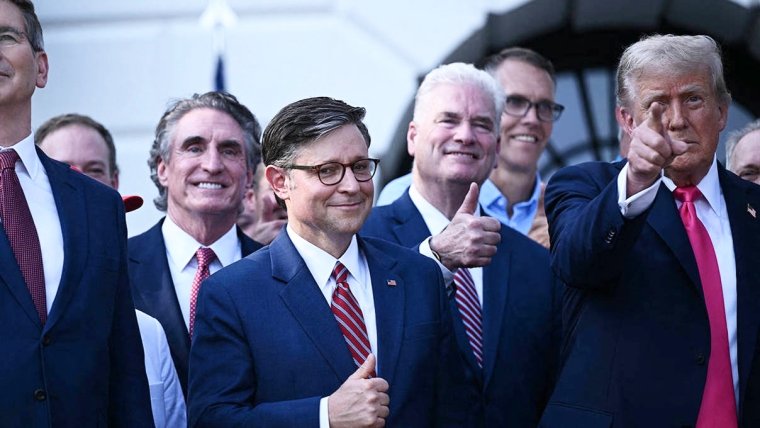
When he was France’s finance minister in the 1960s, former French President Valéry Giscard d’Estaing famously complained about the “exorbitant privilege” that the dollar’s position as the world’s leading reserve currency conferred on the United States. This meant, essentially, that the US could borrow at low interest rates, run persistently large trade deficits, and print money to finance its budget deficits. He never could have imagined that the US would end up letting these advantages slip through its fingers.
Since returning to the White House in January, US President Donald Trump has been systematically destroying faith in the dollar in both global financial markets and among governments and central banks. For starters, Trump has put America’s public finances on an even more unsustainable path than they were on before he took office.
When Trump began his second term, the US budget deficit had already widened to 6.2% of GDP, with nearly full employment, while the public-debt-to-GDP ratio had risen to around 100%. But things are about to get much worse. Far from putting America’s fiscal house in order, Trump and his supporters in Congress have pushed through their “Big, Beautiful Bill,” a tax and spending bill that the non-partisan Congressional Budget Office estimates will add around $3.4 trillion to the budget deficit over the next decade.
America’s public-debt-to-GDP ratio is now on track to reach a level that, by 2030, will be far higher than at the end of World War II, when the US enjoyed far more favourable demographics. Unlike during the postwar period, the US economy today is not equipped to grow its way to a smaller debt burden. Little wonder that the major credit agencies, like Moody’s, have now stripped the US of its AAA credit rating.
Trump is further undercutting confidence in the dollar with his apparent lack of concern about keeping inflation in check. Inflation is currently running above the US Federal Reserve’s 2% target, and is at risk of rising further, owing to Trump’s aggressive tariffs on foreign imports, which have reached levels not seen in 100 years. Yet Trump is pressuring the Fed to cut interest rates by 1-2 percentage points, and signaling that he intends to appoint a monetary-policy dove to succeed the current Fed chair, Jerome Powell, whose term expires in May 2026.
Making matters worse, Trump has been casting doubt on America’s commitment to honoring its debt commitments fully. Buried in early drafts of his “Big, Beautiful Bill” was a provision allowing for the imposition of a “revenge tax” of up to 20% on foreign owners of US assets, including Treasury bonds, if they hail from countries with tax policies the Trump administration deems “unfair” to the US. Moreover, key Trump advisers have suggested forcing foreign central banks to convert the US Treasury bills they hold into 100-year US bonds without coupon payments, as part of the proposed Mar-a-Lago Accord.
Add to that Trump’s apparent disregard for the rule of law, and markets see little reason to trust the US. This explains why the dollar has depreciated by more than 10% since the beginning of 2025, marking its worst performance in the first half of a year since 1973. This slide is all the more jarring in light of Trump’s sharp tariff hikes and the widening of the short-term interest-rate differential with other major economies – developments that one would expect to boost the dollar’s value.
Another indication of collapsing market confidence in the US is the more than 25% surge in gold prices over the last six months. And the all-important ten-year Treasury bond yield – which spiked after Trump announced his “Liberation Day” tariffs at the start of April – remains elevated, despite considerable stock-market turbulence, which normally would have triggered a flight to the perceived safety of the US Treasury market.
The message could not be clearer: markets are displeased with the Trump administration’s economic-policy path. The problem for Trump is that, unlike politicians, markets cannot be pressured or primaried. If he refuses to heed investors’ warnings, as seems likely, the US should brace for a dollar and bond-market crisis in the run-up to next year’s midterm elections. The days of the world letting America live beyond its means are rapidly coming to an end.
Desmond Lachman, a senior fellow at the American Enterprise Institute, is a former deputy director of the International Monetary Fund’s Policy Development and Review Department and a former chief emerging-market economic strategist at Salomon Smith Barney. Copyright 2025 Project Syndicate, here with permission.
2 Comments
Desmond is saying much the same as many other commentators, and I agree with him. What I struggle to understand is how the USA electorate has done, and has continued to allow this state of affairs. I can remember my high school geography teacher saying in the 1960's that the USA ran up large debts and got the rest of the world to pay for it- which is backed up by 'This meant, essentially, that the US could borrow at low interest rates, run persistently large trade deficits, and print money to finance its budget deficits. He never could have imagined that the US would end up letting these advantages slip through its fingers'.
IMO the USA citizens in sufficient numbers who voted to obtain a Republican win must think that they're the best in the world and that everyone else owes them '“exorbitant privilege”' just as Desmond reports are getting close to if not already enslaved by delusional self aggrandizement, resulting in destructive actions for the world economy and for millions of people.
The entrenched power of the elites has meant they have stacked the deck in their favour, and that includes how the electoral colleges work. The slide of this has essentially made the US a two party state, with any independents essentially having little to no power unless the houses are balanced blue v red. The current state is much worse as the controlling party in both houses, the Republicans, have ceded all their power to the president and are refusing to carry out their constitutionally required oversight of the executive office. To all extents, despite their oath of office they've shit canned the constitution.

We welcome your comments below. If you are not already registered, please register to comment
Remember we welcome robust, respectful and insightful debate. We don't welcome abusive or defamatory comments and will de-register those repeatedly making such comments. Our current comment policy is here.